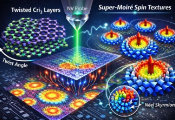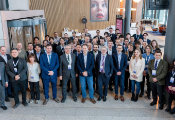PsiQuantum Partners with Queensland Universities, Bolstering the Future of Quantum Computing in Australia
Queensland, July 16, 2024 -- PsiQuantum will partner with five leading universities in Queensland, after signing a memorandum of understanding, to help support the growing demand for skills in the quantum computing economy and to explore research projects in adjacent fields. This collaboration will provide a framework for academic institutions in Australia to offer opportunities for academic, postgraduate, and undergraduate placements that will attract and retain leading Australian and global talent.
Within this partnership, PsiQuantum will work closely with the five universities to build out targeted educational programs to meet the skills requirements for the rapidly growing sector of quantum computing and other advanced technology industries. These skill sets cover a wide variety of roles from that of quantum applications engineers, mechanical, optical, and electrical engineers; software developers, and technical lab staff.
“Australia and Queensland have been world leaders in the field of quantum computing for decades, and this partnership builds upon that foundation. This collaboration will help ensure that Australia is developing the necessary skills and driving research to continue leading this field for decades to come.”said Jeremy O'Brien, PsiQuantum CEO & Co-Founder.
The educational programs will draw input from PsiQuantum’s teams in the development of study modules, courses, degree, lectures and industry training; providing pathways for traditional STEM careers like engineering and software development into the quantum sector, upskilling diverse scientists to work on critical applications of quantum computing technology, and preparing quantum physicists for the industry revolution. This partnership will also include areas of joint research interest and expand these into larger projects as they progress.
Quantum computers hold the promise of re-engineering how critical industries function, from modeling molecular structures at the subatomic level to bring drugs to market faster to designing new catalysts to help supercharge the efforts in solving climate change and decarbonizing our planet. By targeting the current and future skills needed within the quantum computing sector and the anticipated fields of professional specialization.




































